广州版英语小学六年级专题复习
教科版(广州)六年级英语上期末总复习习题课件

( F) 1. Jack washes his car on XXXday.
( T) 2. Jack often asks his family to help his uncle.
( F) 3. Jack has no child.
阅读理解练习
三、读短文,根据短文内容用单词的正确情势填空。
I am 1. having a great time in Guilin. 2. On the first day we went on the river cruise, and we saw a lot of monkeys 3. by the river. It rained yesterday, 4. but we had so much fun. We played games with the other children and took 5.plenty/lots. of photos. Tomorrow we 6.will visit the caves(岩洞).
句型练习
4. The girl is tall. Her brother is short . 5. Tom read a storybook with his friend yesterday. 6. The boy likes ly food. I think it is not healthy.
词汇练习
圈出不同类者。
1. A. goat
B. goose
2. A. wide
B. country
3. A. medicine B. fever
4. A. first
B. second
5. A. bought B. picked
C. sheep C. crowded C. toothache C. third C. wore
广州小学英语六年级知识点
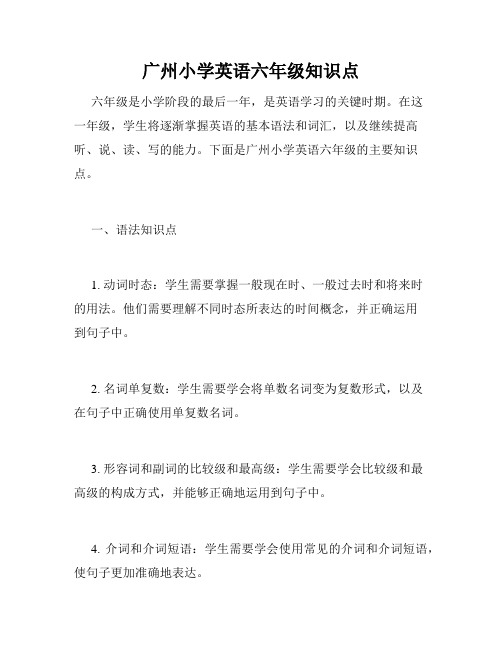
广州小学英语六年级知识点六年级是小学阶段的最后一年,是英语学习的关键时期。
在这一年级,学生将逐渐掌握英语的基本语法和词汇,以及继续提高听、说、读、写的能力。
下面是广州小学英语六年级的主要知识点。
一、语法知识点1. 动词时态:学生需要掌握一般现在时、一般过去时和将来时的用法。
他们需要理解不同时态所表达的时间概念,并正确运用到句子中。
2. 名词单复数:学生需要学会将单数名词变为复数形式,以及在句子中正确使用单复数名词。
3. 形容词和副词的比较级和最高级:学生需要学会比较级和最高级的构成方式,并能够正确地运用到句子中。
4. 介词和介词短语:学生需要学会使用常见的介词和介词短语,使句子更加准确地表达。
5. 基本句型:学生需要学会构造基本的英语句型,包括肯定句、否定句、疑问句等。
6. 从句的用法:学生需要学会理解和使用主从复合句,包括宾语从句、定语从句和状语从句等。
二、词汇知识点1. 常见的动词、形容词和副词:学生需要掌握基本的动词、形容词和副词,以丰富自己的词汇量。
2. 日常生活用词:学生需要熟悉和运用日常生活中常见的词汇,包括食物、衣物、家居用品等。
3. 学科课程用词:学生需要掌握与学科相关的词汇,包括数学、科学、地理等。
4. 动物和植物的名称:学生需要熟悉并记住常见的动物和植物的名称。
5. 人体部位和感觉词汇:学生需要学会使用描述人体部位和感觉的词汇,以便进行交流。
三、听力知识点1. 听懂日常用语:学生需要通过听力练习,逐渐提高对日常用语的理解能力。
2. 听懂简短对话和问题:学生需要通过听取简短对话和问题,理解并正确回答相关问题。
3. 听懂短文和故事:学生需要通过听取短文和故事,能够理解并记住主要内容,并回答相关问题。
四、阅读知识点1. 阅读理解:学生需要通过阅读短文,理解并回答相关问题。
他们需要掌握基本的阅读技巧,如寻找关键词、推测词义等。
2. 词汇理解:学生需要通过阅读,掌握理解生词的技巧,如通过上下文推测词义等。
六年级广东版英语知识点
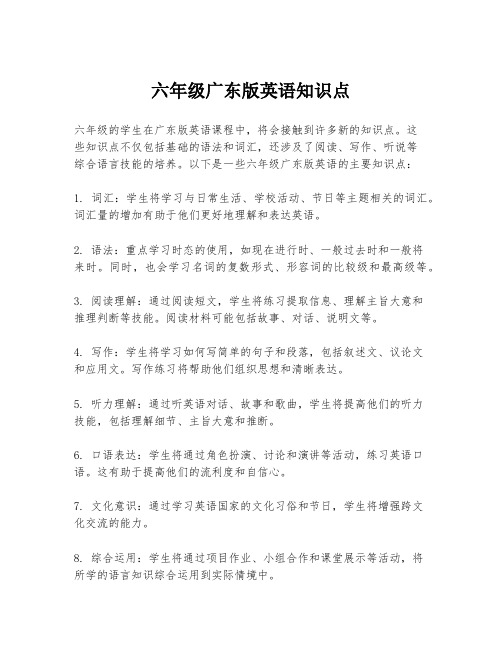
六年级广东版英语知识点六年级的学生在广东版英语课程中,将会接触到许多新的知识点。
这些知识点不仅包括基础的语法和词汇,还涉及了阅读、写作、听说等综合语言技能的培养。
以下是一些六年级广东版英语的主要知识点:1. 词汇:学生将学习与日常生活、学校活动、节日等主题相关的词汇。
词汇量的增加有助于他们更好地理解和表达英语。
2. 语法:重点学习时态的使用,如现在进行时、一般过去时和一般将来时。
同时,也会学习名词的复数形式、形容词的比较级和最高级等。
3. 阅读理解:通过阅读短文,学生将练习提取信息、理解主旨大意和推理判断等技能。
阅读材料可能包括故事、对话、说明文等。
4. 写作:学生将学习如何写简单的句子和段落,包括叙述文、议论文和应用文。
写作练习将帮助他们组织思想和清晰表达。
5. 听力理解:通过听英语对话、故事和歌曲,学生将提高他们的听力技能,包括理解细节、主旨大意和推断。
6. 口语表达:学生将通过角色扮演、讨论和演讲等活动,练习英语口语。
这有助于提高他们的流利度和自信心。
7. 文化意识:通过学习英语国家的文化习俗和节日,学生将增强跨文化交流的能力。
8. 综合运用:学生将通过项目作业、小组合作和课堂展示等活动,将所学的语言知识综合运用到实际情境中。
9. 自我评价:鼓励学生进行自我反思和评价,以提高自主学习能力和自我监控能力。
10. 学习策略:教授学生有效的学习策略,如预习、复习、笔记技巧等,帮助他们更有效地学习英语。
通过这些知识点的学习,六年级的学生将为进一步的英语学习打下坚实的基础,并为将来的学术和职业生涯做好准备。
记住,学习语言是一个持续的过程,需要耐心和持续的努力。
(完整word版)广州版六年级英语复习
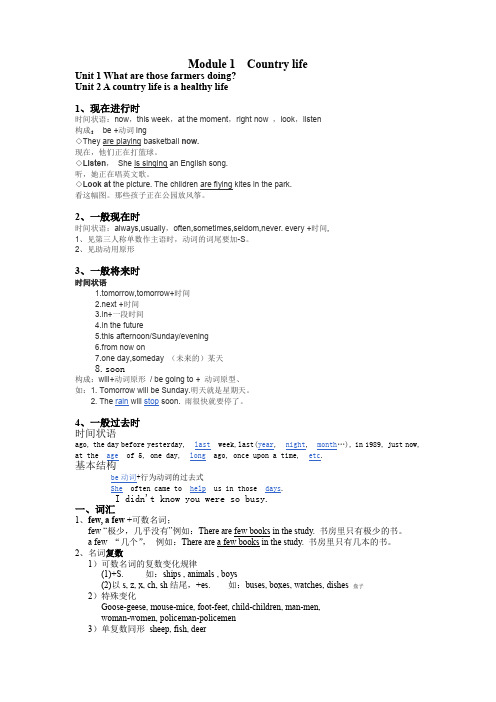
Module 1 Country lifeUnit 1 What are those farmers doing?Unit 2 A country life is a healthy life1、现在进行时时间状语:now,this week,at the moment,right now ,look,listen构成:be +动词ing◇They are playing basketball now.现在,他们正在打篮球。
◇Listen,She is singing an English song.听,她正在唱英文歌。
◇Look at the picture. The children are flying kites in the park.看这幅图。
那些孩子正在公园放风筝。
2、一般现在时时间状语:always,usually,often,sometimes,seldom,never. every +时间,1、见第三人称单数作主语时,动词的词尾要加-S。
2、见助动用原形3、一般将来时时间状语1.tomorrow,tomorrow+时间2.next +时间3.in+一段时间4.in the future5.this afternoon/Sunday/evening6.from now on7.one day,someday (未来的)某天8.soon构成:will+动词原形/ be going to + 动词原型、如:1. Tomorrow will be Sunday.明天就是星期天。
2. The rain will stop soon. 雨很快就要停了。
4、一般过去时时间状语ago, the day before yesterday, last week,last(year, night, month…), in 1989, just now, at the age of 5, one day, long ago, once upon a time, etc.基本结构be动词+行为动词的过去式She often came to help us in those days.I didn't know you were so busy.一、词汇1、few, a few +可数名词;few “极少,几乎没有”例如:There are few books in the study. 书房里只有极少的书。
广州新版本英语小学六年级的下册的每单元总结复习学习知识点总结计划.doc

广州新版本英语小学六年级的下册的每单元总结复习学习知识点总结计划.doc广州新版英语六年级下册每单元知识点总结得牢in a hurry匆忙in such a hurry 如此匆忙 be like 像?一be patient耐心点talk on the phone carry a heavy bag 背很重的包work harder 更努力地工作或学slow and steady 打扎三要点点都知道1. try to do something 努力做某事如: She tried to eat with his left hand because his right hand was broken.因右手受了所以她努力用左手吃.2.in a hurry 匆忙,着急如: In the morning, everybody is in a hurry. 早上的候每个人都很匆忙.3. You are like that silly hare. Like 像??一 ,如 The flower is likea cup. 花像一个茶杯 .4.一般在表示在常反复生的作、存在的状或性的作的第三人称化律:1 一般情况直接加_____________________ .2 以 _____________________尾的加_____________________.3 以_____________________尾的去___________加___________________.4 特殊情况 ________________.unit2 waiting for another hare【知考点一】 Ving 做主,用数名作主,在的基上加ing,使具有名的各种特征,可作名灵活使用.Reading is an art. 是一种 .Climbing mountains is really fun. 爬山真是有趣 . _________ __________ believing. (眼)【知考点二】 pick up1. pick up :起,拾起pick up sth = pick sth up 起某物pick up the hare = pick the hare up若代,只能位于pick 与 up 之把它起来pick it up2. pick up :用()来接,到某去接某人,也可以是中途便把人或物走.Your books are on the ground , please_______________________.(把他起来 )【知考点三】 hard work与work hardwork hard 努力工作(短)hard work繁重的工作(名短)例句: If you work hard you will succeed. 如果你努力工作,你就会成功.Working in the field every day is hard work.学用功____________努力的学【知考点四】辨析another other others1、other可作形容或代,做形容,意思是“ 的,其他”,泛指“其他的(人或物)”.如:Do you have any other question(s)? 你有其他?Ask some other people. 人吧!Put it in your other hand. 把它放在你另一只手里.2、others是other的复数形式,泛指“另外几个”,“其余的”.在句中可作主、 .如: Give me some others, please. 我的西吧 .3、another=an+ other,既可作形容,也可作代,只能用于三个或更多的人或物,泛指同事物中的三者或三者以上的“另一个”,只能代替或修数可数名.如:I don’tlike this one. Please show me another. 我不喜一个,我看看另一个.【知考点五】stop doing sth1、stop doing停止正在做的某事.例: I must stop smoking.我必戒烟了.2、stop to do停止,中断做某事后去做另一件事.个“ do代”表的就是即将做的事情.例: They stop to play football.【知识考点六】 from then onfrom then on 从那时起from now on 从现在起【知识考点七】反身代词myself yourself himself herself itself我自己你自己他自己她自己它自己ourselves yourselves themselves themselves themselves我们自己你们自己他们自己她们自己它们自己【知识考点八】注意以下词组中to 的用法have nothing to eat 没东西吃have nothing to say没话说have nothing to to没事可做【知识考点九】One day, a farmer was working in the field. 使用的是过去进行时态.过去进行时用来讲述过去某个时间正在发生的事情.将现在进行时中的be 动词 am, is, are变为 was,were 就构成过去进行时了.例如: They were watching TV when you called.【知识考点十】一般过去时动词过去式变化规则:1.一般在动词末尾加-ed,如: pull-pulled, cook-cooked2.结尾是 e 加 d,如: taste-tasted3.末尾是辅音字母加一个元音字母和一个辅音字母的重读闭音节,应双写末尾的辅音字母,再加-ed,如: stop-stopped4.以“辅音字母+y”结尾的,变y 为i ,再加-ed,如:study-studied词组记得牢Play a game 玩个游戏back leg 后腿Look like 看起来像king of the animals 动物之王要点难点都知道1.英语语法之肯定句变否定句,肯定句变否定句口诀,给句子分析它,看它结构是哪个主加be后加not 其他一切全照抄,主加动词主重要,don't doesn't 来帮忙, don't doesn't 中间夹doesn't doesn't 最特殊第三人称单数全靠它 .Unit 4 We can save the animals +-词组记得牢Many other 其他许多的in danger 处于危险中Disappear forever永远消失cut down forests 砍伐森林Pollute ocean 污染海洋have no place to live in 没有的地方生活Things made from animals 动物制成品do something about it 为此做点生么Plant trees 栽种树木work together 共同努力,合作Save the animals 挽救动物要点难点都知道1. 肯定句中并列部分最后两个词用and 连接,否定句中用or 连接,如 :I have a rabbit, a cat and two birds. She doesn ’ t have any toys or pets.2.Many people buy things made from these animals, like medicines, fur coats and even foods.Like 意思是:“如,如” Chinese are good at sports like badminton, table tennis and swimming.3.never 开的祈使句表示烈的否定,相当于“千万不要,一定不要”:Module 3 Famous people主要短:about a famous historical person(有关于一位著名的史人物)、be born in /on?the father of modern China, go on,try to+ 的原形, started to+原, begin to +原,make a speech,in the forest, take from?, give to?find,found–,hold-held, pay-paid( 支付 ),:主要句型:1. Dr Sun Yatsen was born in Guangdong.(地点前用 in)He was born in 1866.(年和月前用in) I was born on August 17th, 1998.( 有具体的日期,用on)2.What do you mean?(你指的是什么意思? )3. He was against the emperor.4.He tried to change China and free the people.5. In 1976, the Chinese people lost their Premier Zhou Enlai. =Premier Zhou Enlai died in 1976.6.It doesn ’ t matter没关.(系 )7.Can you tell me more about him?(注意 more的位置 )8.When was he born and when did he die?------ He was born in 1881 and died in 1936.主要法:1、 I think he loved the people and the people loved him.( 从句 )He died in 1791 when he was 35years old.(状从句 )2、 In the 14th century 在 14世(指从 1300年 -1399年)3、 the +形容是指某一的人.the poor指人.4、 be+行的去分构成了被.被中的仍旧要考.The 2008 Olympic Games were held in Beijing. (已行了,所以用被的去)The 2010 Asian Games will be held in Guangzhou. (未行,用被的将来)年代的法●大多数的没有“ 0的”年代都是看作两个十位的数字来比如:1981 nineteen eighty-one●但是有零的就不一了:1)三个零:就是把年代直接作...thousand如:2000 two thousand2)两个零在中:要作:... thousand and ... 如:2008 two thousand and eight3)两个零在尾:要把前面两个数字成十位数,后面加上hundred如: 1900 nineteen hundred4)一个零在百位,一个零在个位:作:...thousand and ...ty 如:1090 one thousand and ninety5)只有一个零在个位:仍旧看成两个十位数来如:1990 nineteen ninety6)只有一个零在十位:前面两位当作十位数来,十位的零作“ oh,”个位直接如: 1906 nineteen oh six7)只有一个零在百位:有两种法:第一种法:仍旧看成两个十位数来如: 2015 twenty fifteen第二种法:作... thousand and ...如:2015 two thousand and fifteen8)公元前BC公元ADUnit 8 The magic words得牢in the middle of 在?中walk through a park 穿公园many more 其他更的none of them 没有一个cry out 喊出声at the bottom of 在?的底部A tree with a sign on it 一挂着牌子的lead to 通向?the best party ever 最好的派this is why?就是?的原因full of?是?三、要点点都知道1.情: should表示“ ,告,建,命令”否定shouldn’tI should help her because she is in danger她.在于危中,我帮助她.你真不整天玩.Must表示“必,必要”否定mustn’t表示“禁止,不准”注意,must提否定回答使用needn’t,而不能用mustn’t :We must go to school now. 我在必去学校.We mustn’ t swim in the river.我不准在河里游泳.Will 表示“将来”,常用一般将来;否定“ won’ t”He will be back in ten minutes. 她十分内将回来.我将不会玩游.U9 Where will you go?1、重要句型If you can travel to in the world, where will you go?如果你可以去世界上任何一个国家旅游,你将会去哪里呢?2、it's a to go shopping.那是个物的好地方.3、to buy a robot there.我想在那里个机器人.4、If I can I will go to France.如果我可以去国外旅游,我想去巴黎.5、I love food and people say that pairs is the of the world!我喜食物,人巴黎世界上的美食之都.3)知考点回【知点一】【知点二】【知点三】【知点四】【知点五】【知点六】can aux. 能;能;可以;可能choose去式:第三人称数:abroad 国外的,去国外旅游去国外学the capital of的?首.都I ‘d like to我??想做?..If I can do??, I will do?.U10 I can ’ t wait to see you复重点句型1.Thanks so much for me you in Canada. 你邀我去加拿大拜你 .2.I can't wait you. 我迫不及待想到你 .3.I'm very to stay your family. 和你家人呆在一起我很 .4.I will you a present that money. 我将会用那些你个生日礼物 .5.And I plan Chinatown in Toronto, too. 我打算去多多参唐人街 .6. I finally my last week and I my plane today.我于在上个星期拿到了照,我今天已定了机票.7. I will the airport next month, June 12th.我将于下个月,也就是六月十二号到达机.8. The plane at 1 p.m. 机在下午一点登 .4)通文,回知点【知点一】 thanks for / thank you for doing ?. 个句式用来表示人做某事的感.for 是介,其后要接名或者名,不接不定式.例如:Thank you for (邀 ) me to your party. Thanks your letter. 你我写的信 .【知点二】 invite 邀名: invitation1.invite+sb 邀某人2.invite+sb+to do sth 邀某人做某事one's friend dinner 招待朋友吃【知点三】 visit 拜、参;visit sb /sp 拜某人 /某地He was the first pope to the White House. 他是白的第一位教皇 .This afternoon we're going to a friend in hospital.今天下午我打算去看望一位住院的朋友.【知点四】can’t wait to do sth迫不及待做某事 I to go home. 我迫不及待想回家【知点五】 exciting: adj. 令人的 , 使人激的 ,主是物或事 ; excited: adj.的:于激状的;的;激昂的, 主人多 .This movie is so . 部影真人、激 .she's so 于即将来到的假日,她不已 .She is very to watch the match. 看比,她非常 .【知点六】 buybuy sb sth = buy sth for sb 某人?.My mother always me some chocolates . I a present her yesterday.是我多巧克力,我昨天她了一个礼物.【知点七】 book book ticket 票I a plane ticket yesterday. 我昨天了一机票 .British officials already hotels the women and children yesterday.英国官昨天已女和儿童了房.【知点八】 land 登、到达The plane at 1 p.m. 机在下午一点到达 .。
广州小学英语六年级上期末复习题
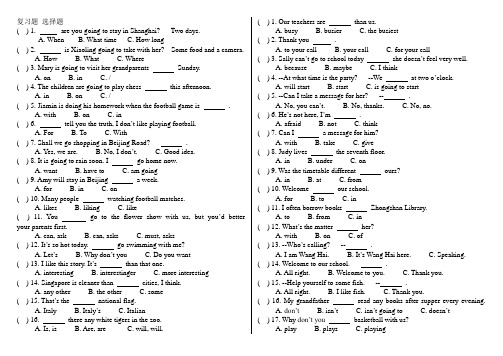
复习题选择题( ) 1. are you going to stay in Shanghai? Two days.A. WhenB. What timeC. How long( ) 2. is Xiaoling going to take with her? Some food and a camera.A. HowB. WhatC. Where( ) 3. Mary is going to visit her grandparents Sunday.A. onB. inC. /( ) 4. The children are going to play chess this afternoon.A. inB. onC. /( ) 5. Jiamin is doing his homework when the football game is .A. withB. onC. in( ) 6. tell you the truth, I don’t like playing football.A. ForB. ToC. With( ) 7. Shall we go shopping in Beijing Road? .A. Yes, we are.B. No, I don’t.C. Good idea.( ) 8. It is going to rain soon. I go home now.A. wantB. have toC. am going( ) 9. Amy will stay in Beijing a week.A. forB. inC. on( ) 10. Many people watching football matches.A. likesB. likingC. like( ) 11. You go to the flower show with us, but you’d better your parents first.A. can, askB. can, asksC. must, asks( ) 12. It’s so hot today. go swimming with me?A. Let’sB. Why don’t youC. Do you want( ) 13. I like this story. It’s than that one.A. interestingB. interestingerC. more interesting( ) 14. Singapore is cleaner than cities, I think.A. any otherB. the otherC. some( ) 15. That’s the national flag.A. ItalyB. Italy’sC. Italian( ) 16. there any white tigers in the zoo.A. Is, isB. Are, areC. will, will. ( ) 1. Our teachers are than us.A. busyB. busierC. the busiest( ) 2. Thank you .A. to your callB. your callC. for your call( ) 3. Sally can’t go to school today she doesn’t feel very well.A. becauseB. maybeC. I think( ) 4. --At what time is the party? --We at two o’clock.A. will startB. startC. is going to start( ) 5. --Can I take a message for her? -- .A. No, you can’t.B. No, thanks.C. No, no.( ) 6. He’s not here, I’m .A. afraidB. notC. think( ) 7. Can I a message for him?A. withB. takeC. give( ) 8. Judy lives the seventh floor.A. inB. underC. on( ) 9. Was the timetable different ours?A. inB. atC. from( ) 10. Welcome our school.A. forB. toC. in( ) 11. I often borrow books Zhongshan Library.A. toB. fromC. in( ) 12. What’s the matter her?A. withB. onC. of( ) 13. --Who’s calling? -- .A. I am Wang Hai.B. It’s Wang Hai here.C. Speaking. ( ) 14. Welcome to our school. .A. All right.B. Welcome to you.C. Thank you.( ) 15. --Help yourself to some fish. -- .A. All right.B. I like fish.C. Thank you.( ) 16. My grandfather read any books after supper every evening.A. don’tB. isn’tC. isn’t going to C. doesn’t( ) 17. Why don’t you basketball with us?A. playB. playsC. playing( ) 1. Where would you like to go holiday?A. onB. inC. at( ) 2. Look at this flag. national flag is it?A. WhereB. WhatC. When( ) 3. Washington D.C. is than Wellington.A. bigB. biggerC. biggest( ) 4. Paris and Rome are soA. noisyB. noisierC. noisiest( ) 5. Mum. It’s birthday soon.A. meB. mineC. my( ) 6. Can I to Janet’s house?A. goingB. goesC. go( ) 7. -- Is your father going to Guilin tomorrow? --A. No, he isn’t.B. No, he doesn’t.C. No, he can’t.( ) 8. – It’s raining. We cant play football. -- .A. Oh, I’m so bored.B. Great!C. I hope so.( ) 9. – Would you like to go to the cinema with me? -- .A. Yes, I like.B. No, I’ve no time.C. Well, maybe later. ( ) 10. – Mum, can I go to Mike’s house? -- .A. You’re welcome.B. That’s all right.C. Of course you can. ( ) 11. – Can I speak to Mary, please? --A. Yes, you can.B. Who are you?C. Speaking.( ) 12. I was at school .A. this morningB. tomorrow morningC. in the morning ( ) 13. – Shall we go sightseeing tomorrow? --A. You are all right.B. You are right.C. That’s a good idea. ( ) 14. She’s not here, .A. I’m afraid.B. I think so.C. I hope not.( ) 15. I you yesterday. But you at home.A. called, weren’tB. call, aren’tC. called, aren’t( ) 16. She said she a headache last night.A. haveB. hadC. has ( ) 1. We been to the Great Wall.A. hasB. areC. have( ) 2. What are you doing Sunday morning?A. atB. inC. on( ) 3. It’s the national flag. The capital of is Ottawa.A. Canada ; CanadianB. Canadian ; CanadaC. Canada ; Canada ( ) 4. We’ll have holiday.A. an seven-dayB. an seven-daysC. a seven-day( ) 5. My mother usually goes to work bike.A. onB. byC. to( ) 6. Sometimes he his homework before supper after school.A. doB. doingC. does( ) 7. Would you like with me after school.?A. playing footballB. to play footballC. play football ( ) 8. She to the cinema to see a film last Sunday evening.A. goes, /B. goes, onC. went, /( ) 9. How is Shanghai from Beijing?A. longB. awayC. far( ) 10. All of are going to take photos in the Six Banyan Temple.A. theyB. themC. their( ) 11. China is the third country is the world.A. largeB. largerC. largest( ) 12. Easter is popular and important than Christmas in the UK.A. littleB. lessC. lest( ) 13. -- you like to come to tea with us? -- OK. Thank you.A. CouldB. WouldC. Shall( ) 14. Yesterday all my family at home.A. wereB. areC. was( ) 15. I think Guangzhou is than London.A. crowdedB. more crowdedC. the most crowded( ) 16. – Help yourself some cakes. – Thank you very much.A. toB. forC. eat按实际情况回答问题1. Who is your P.E. teacher?2. How many stars are there in the national flag of the USA?3. Is Moscow the capital of the Russia?4. What colour is the national flag of Italy?5. What time do you usually go to school?6. Is your English teacher a man or a lady?7. Did you finish your English homework last night?8. How do you usually go to school?9. Where did you go last Sunday?10. Did you have an English lesson yesterday?11. What is the most important festival in China?12. Is Tokyo the capital of Japan?13. How many seasons are there in a year? What are they?14. Which month is the hottest in Guangzhou?15. What animals only live in China?16. What city is the capital of China?17. What food do Chinese people usually have for dinner?18. Which is the most popular festival in China?19. When is our National Day?20. What is the most important festival in England?21. Do you often get lucky money at the Spring Festival?22. How did you get home from school yesterday?23. How tall are you?24. What do you usually do at the weekend?25. What’s your favourite hobby?26. When is your birthday?27. Were you at home this morning?28. Are you busy now?29. Did you do your homework yesterday evening?30. What’s your telephone number?31. Did you have an English lesson yesterday afternoon?32. 完成对话(一)(that, may, it’s, matter, were, was, speaking, thank,will, did,)A: Hello, I speak to Jane?B: . Who’s ?A: Yongxian here.B: Hello, Yongxian. What’s the ?A: I lost my book. you in the classroom yesterday?B: Yes, I was.A: you see my book?B: Yes, your book on the teachers’ desk yesterday. But Xiaoling took your book. She give you your book tomorrow.A: OK. you.B: That’s all right.(二)(and, may, how, love, was, fine, would, speaking, weren’t, having,)A: Hello. I speak to Mrs. Webb?B: . Who’s that, please?A: It’s Mrs. White here.B: are you, Mrs. White?A: I’m , thank you. you?B: I’m fine too. Thanks.A: I called you this afternoon. But you at home.B: Sorry, I at the market.A: I’m a party at home. you like to come?B: I’d to.(三)(leave, play, here, soon, did, out, speak, calling, have, see,)1.A: Good morning, Oak Tree School. Can I help you?B: Good morning. May I to Jim, please?A: He’s talking to the headmaster. Who’s , please?B: This is his friend Jack . Could I a message?A: Yes, of course.2.A: Hello.B: Hi, Ben, you call me this morning?A: Yes, I did. Your Mum said you were .B: Yes, I was skating in the gym.A: I a new computer game. Do you want to it with me? B: Great. I am bored here. I’ll come to your house .A: See you then.B: you.(四)(play, thanks, to, speaking, got, this, sorry, see, helping, about,)A: Hello. May I speak to Nannan, please?B: .A: Hi, Nannan. is Ann. Would you like to come to my home today? I’ve a new kite. Would you please it with me?B: I’d love to, .A: Can you come now?B: I’m I can’t. I’m my mother. She’s washing our clothes. A: Can you come this afternoon?B: Yes, I’d love to.A: That’s fine. At 1:45?B: When?A: A quarter two?B: Yes, OK. you then. 用动词的适当形式填空做题步骤:1. 找时间,写出中文和时态。
广州版英语小学六年级专题复习
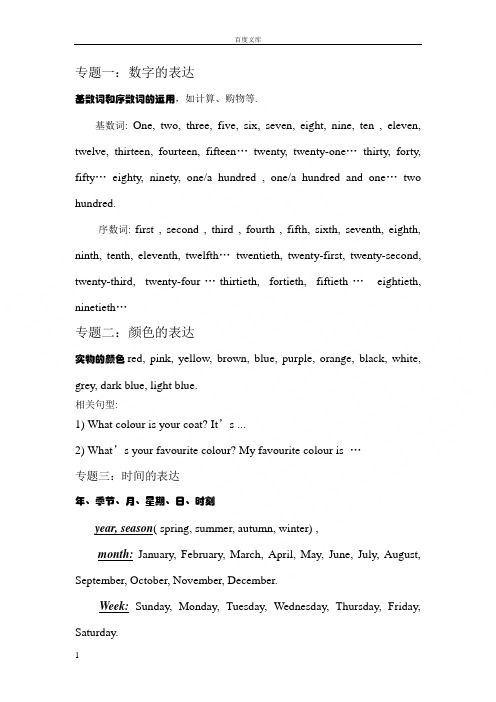
专题一:数字的表达基数词和序数词的运用,如计算、购物等.基数词:One, two, three, five, six, seven, eight, nine, ten , eleven, twelve, thirteen, fourteen, fifteen…twenty, twenty-one…thirty, forty, fifty…eighty, ninety, one/a hundred , one/a hundred and one…two hundred.序数词: first , second , third , fourth , fifth, sixth, seventh, eighth, ninth, tenth, eleventh, twelfth…twentieth, twenty-first, twenty-second, twenty-third, twenty-four…thirtieth, fortieth, fiftieth…eightieth, ninetieth…专题二:颜色的表达实物的颜色red, pink, yellow, brown, blue, purple, orange, black, white, grey, dark blue, light blue.相关句型:1) What colour is your coat? It’s ...2) What’s your favourite colour? My favourite colour is …专题三:时间的表达年、季节、月、星期、日、时刻year, season( spring, summer, autumn, winter) ,month:January, February, March, April, May, June, July, August, September, October, November, December.Week:Sunday, Monday, Tuesday, Wednesday, Thursday, Friday, Saturday.Day: 1st May (the first of May), May 2nd ( May the second)Time: (an) hour, minute, second10:05 (five minutes past ten, ten o five) 10:10 (ten minutes past ten, tenten)10:15 (quarter past ten, ten fifteen) 10:30 (half past ten, ten thirty)10:45 (quarter to eleven, ten forty-five) 1:00 (eleven o ’clock)专题四:人称代词的主格、宾格、形容词性物主代词和名词性物主代词【巩固练习】一、回答问题,把适合的答案的字母编号写在横线上。
广东六年级英语复习资料
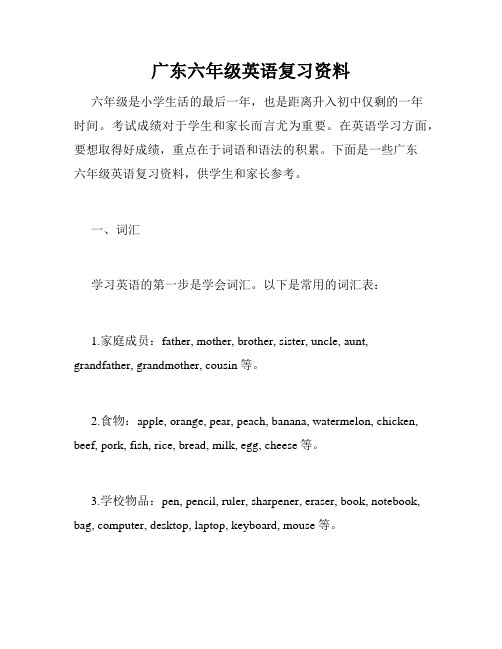
广东六年级英语复习资料六年级是小学生活的最后一年,也是距离升入初中仅剩的一年时间。
考试成绩对于学生和家长而言尤为重要。
在英语学习方面,要想取得好成绩,重点在于词语和语法的积累。
下面是一些广东六年级英语复习资料,供学生和家长参考。
一、词汇学习英语的第一步是学会词汇。
以下是常用的词汇表:1.家庭成员:father, mother, brother, sister, uncle, aunt, grandfather, grandmother, cousin等。
2.食物:apple, orange, pear, peach, banana, watermelon, chicken, beef, pork, fish, rice, bread, milk, egg, cheese等。
3.学校物品:pen, pencil, ruler, sharpener, eraser, book, notebook, bag, computer, desktop, laptop, keyboard, mouse等。
4.时间和日期:weekday, weekend, Monday, Tuesday, Wednesday, Thursday, Friday, Saturday, Sunday, year, month, day, date等。
5.颜色:red, yellow, blue, green, purple, black, white, orange等。
二、语法英语语法对学生而言通常是一个难点,需要大量练习和记忆才能掌握。
以下是常见的语法知识点:1.动词时态:常见的有现在时、过去时、将来时等;2.语句构成:由主语和谓语构成,常见的情况包括肯定句、否定句、疑问句等;3.名词:包括可数和不可数名词,常见的有单数和复数、名词所有格等;4.形容词和副词:形容词作用是修饰名词,而副词则修饰动词、形容词和其他副词;5.介词:用于表达时间、地点或方式,例如in, on, at, to, from 等。
- 1、下载文档前请自行甄别文档内容的完整性,平台不提供额外的编辑、内容补充、找答案等附加服务。
- 2、"仅部分预览"的文档,不可在线预览部分如存在完整性等问题,可反馈申请退款(可完整预览的文档不适用该条件!)。
- 3、如文档侵犯您的权益,请联系客服反馈,我们会尽快为您处理(人工客服工作时间:9:00-18:30)。
专题一:数字的表达基数词和序数词的运用,如计算、购物等.基数词:One, two, three, five, six, seven, eight, nine, ten , eleven, twelve, thirteen, fourteen, fifteen…twenty, twenty-one…thirty, forty, fifty…eighty, ninety, one/a hundred , one/a hundred and one…two hundred.序数词: first , second , third , fourth , fifth, sixth, seventh, eighth, ninth, tenth, eleventh, twelfth…twentieth, twenty-first, twenty-second, twenty-third, twenty-four…thirtieth, fortieth, fiftieth…eightieth, ninetieth…专题二:颜色的表达实物的颜色red, pink, yellow, brown, blue, purple, orange, black, white, grey, dark blue, light blue.相关句型:1) What colour is your coat? It’s ...2) What’s your favourite colour? My favourite colour is …专题三:时间的表达年、季节、月、星期、日、时刻year, season( spring, summer, autumn, winter) ,month:January, February, March, April, May, June, July, August, September, October, November, December.Week:Sunday, Monday, Tuesday, Wednesday, Thursday, Friday, Saturday.Day: 1st May (the first of May), May 2nd ( May the second)Time: (an) hour, minute, second10:05 (five minutes past ten, ten o five) 10:10 (ten minutes past ten, ten ten)10:15 (quarter past ten, ten fifteen) 10:30 (half past ten, ten thirty) 10:45 (quarter to eleven, ten forty-five) 1:00 (eleven o’clock)专题四:人称代词的主格、宾格、形容词性物主代词和名词性物主代词【巩固练习】一、回答问题,把适合的答案的字母编号写在横线上。
1) —What’s thirty and forty?—That comes to .2) —What’s your telephone number?—My telephone number is .3) —When do you usually get up ?—At .4)—How old are you?—I’m .5)—How much does it cost?—It costs .6)—How many cars have you got?—I have got cars.7) —How many birds can you see in the tree?—I can see .8) —Which floor do you live on?—I live on floor.9)—Excuse me, can you tell me the way to Baiyun hotel?—Yes, go down this street, then turn left at crossing….10) —Who’s girl from the right?—She’s my cousin.二、请写出下列图案的颜色。
三、按实际情况回答问题。
1) —What colour is your coat?—It’s .2) —What’s your favourite colour?—My favourite colour is .四、选择正确的答案,回答问题。
1)—How old is your mother?—She’s .2) —When’s your birthday?—My birthday is .3)—When does spring last?—It lasts for 3 months from .4)—What time is it?—It’s .5)—What day is today?—It is .五、按要求写单词。
1. she _______ (宾格)2. he _________ (形容词性物主代词)3. me ________ (名词性物主代词)4. three __________ (序数词)5. you ________ (形容词性物主代词)6. I _________ (名词性物主代词)7.sixth _______(基数词)8. one _______ (序数词)9. eleven _______ (序数词) 10. they ________ (宾格)专题五:表示时间的介词1)in表示某年,某月,某个季节及没有说明具体某一天的早上,下午和晚上。
2)on表示在具体的某日或某日的上午,下午或晚上。
3)at表示具体的时刻。
4)for表示时间的延续,后面接一段时间。
5)某些固定短语,at night,in the day,at noon,on weekdays,at the weekend,on weekdays,during Spring Festival等。
6)morning,afternoon,evening,night等词前有this,that,yesterday,tomorrow,last,the next,every等限定词,前面不用介词。
巩固练习1.He moved to Beijing 1895.A.inB.onC.atD./2.He was born October,5th,1995.A.inB.onC.atD./3.I visited Shanghai March last year.A.inB.onC.atD./4.We started for the zoo 8:30.A.inB.onC.atD./5.We play sports every afternoon.A.inB.onC.atD./6.I was late for school this morning.A.inB.onC.atD./7.I saw a cartoon film on TV last night.A.inB.onC.atD./8.We are going to have a new teacher tomorrow.A.inB.onC.atD./9.What do you usually have breakfast?A.inB.onC.atD.for10.We could buy hamburgers lunch.A.inB.onC.atD.for表示方位的介词1)at:在某地点(表示比较狭窄的场所) in:在某地(表示比较宽敞的场所) 2)on:在…上面under:在…下面3)near:近的,不远的by:靠在…旁边beside:在隔壁4)in front of:在…前面behind:在…后面其他:opposite:在…对面between:在…之间巩固练习1.The chair is (在…旁边)the table.2.The dog is (在…下面)the chair.3.There is a boy (在…之间)the two sheep.4.The fox is (在…后面)the tree.5.There is a plant (在…里)the corner.6.The girl is standing (靠在…旁边)the window.专题六:连词的用法:(1)并列连词:and“…和…”(2)转折连词:but“…但是…”(3)选择连词:or“…或者…”(4)目的连词:so“所以”+结果(5)when:“当……时”(6)because:“因为……”+原因(7)then:“…然后…”(8)if:“如果”一、选用and、but、when、then、or、so、if、because填空。
1.The girl her mother are waiting for her father outside the bank.2.The canteen is clean bright.3.My room is old clean.4.Dr Sun Yatsen was a great leader an important historical person.5.Sally likes playing the fairy,she doesn’t like play it in the school uniform.6. you want to be a teacher when you grow up,you must study hard.7.I was really excited Miss White said I won the gold medal.8.Mr Chen’s office was full of parents,Mr Webb waited for Mr Chen outside.9.Is the art lesson on Monday Tuesday?10.He first dug a hole,he put in the young tree in the hole.11.I made a birthday card for my mother,she likes it very much.12.I can’t go to your party I have a lot of homework to do.专题七:some:“一些”用于肯定句,询问别人意愿的问句any:“一些”用于否定句和疑问句one(s):“一个,一些”强调数量一用some,any或one(s)填空。
